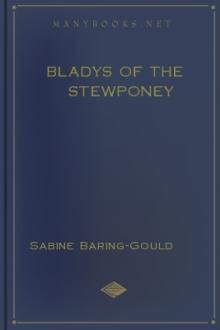The Broom-Squire, Sabine Baring-Gould [books to read this summer txt] 📗

- Author: Sabine Baring-Gould
Book online «The Broom-Squire, Sabine Baring-Gould [books to read this summer txt] 📗». Author Sabine Baring-Gould
With readiness and at once Mehetabel obeyed the summons. There was a bright flush of pleasure in her cheek as she mounted to her place in the little cart, assisted by Joe Filmer, the ostler at the Ship, and folded her shawl about the living morsel that was all the world to her.
"Well, upon my word," said Joe, "I think, Matabel, you've grown prettier than ever, and if Bideabout bain't a happy man, he's different constituted from most of us."
Joe might well express his admiration. The young mother was singularly lovely now, with sufficient of the delicacy of her late confinement still on her, and with the glow of love and pride glorifying her face.
She was very pleased to go to the Ship, not so much because she wanted to see the hostess, as because she desired to show her the babe.
"How is mother?" she asked of Joe Filmer.
The ostler shook his head.
"I should say she hain't long to live. She changed terrible last week. If it weren't for her stories about Gilly Cheel, and one or another, one wouldn't believe it was the same woman. And the master, he is that composed over it all--it is wonderful, wonderful."
Mehetabel was shocked. She was not prepared for this news, and the brightness went out of her face. She was even more alarmed and troubled when she saw Mrs. Verstage, on whose countenance the shadow of approaching death was plainly lying.
But the hostess had lost none of the energy and directness of her character.
"My dear Matabel," she said, "it's no use you wishin' an' hopin'. Wishin' an' hopin' never made puff paste without lard. I haven't got in me the one thing which could raise me up again--the power to shake off my complaint. That is gone from me. I thought for long I could fight it, and by not givin' way tire it out. You can do that with a stubborn horse, but not with a complaint such as mine. But there--no more about me, show me the young Broom-Squire."
After the usual scene incident on the exhibition of a babe that is its mother's pride, a scene that every woman can fill in for herself, and which every man would ask to be excused to witness, Mrs. Verstage said: "Matabel, let there be no disguise between us. How do you and your husband stand to each other now?"
"I would rather you did not ask me," was the young wife's answer, after some hesitation.
"That tells me all," said the hostess. "I did hope that the birth of a little son or daughter would have made all right, assisted by the cookery book, but I see plainly that it has not. I have heard some sort of talks about it. Matabel, now that I stand, not with one, but with two feet on the brink of my grave, I view matters in a very different light from what I did before, and I do not mind tellin' you that I have come to the conclusion that I did a wrong thing in persuadin' you to take Bideabout. I have had this troublin' me for a long time, and it has not allowed me rest. I have not had much sleep of late, because of the pain, and because I always have been an active woman, and it puts me out to be a prisoner in my own room, and not able to get about. Well, Matabel, I have fretted a good deal over this, and have not been able to set my conscience at ease. When Polly knocked off the spout of my china teapot, I said to her, 'You must buy me another out of your wages.' She got one, but 'twasn't the same. It couldn't be the same. The fashion is gone out, and they don't make 'em as they did. It is the same with your marriage with Bideabout. The thing is done and can't be undone. So I need only consider how I can make it up in some other way."
"Mother, pray say nothing more about this. God has given me my baby, and I am happy."
"God has given you that," said Mrs. Verstage, "but I have given you nothing. I have done nothin' to make amends for the great wrong I did you, and which was the spoiling of your life. It is not much I can do, but do somethin' I must, and I will, or I shall not die happy. Now, my plan is this. I have saved some money. I have for many years been puttin' away for Iver, but he does not want it greatly. I intend to leave to you a hundred pounds."
"Mother, I pray you do nothing of the kind.
"I must do it, Matabel, to ease my mind."
"Mother, it will make me miserable."
"Why so?"
Mehetabel did not answer.
"I intend this hundred pounds to be your own, and I shall so leave it that it shall be yours, and yours only."
"Mother, it will make matters worse." After some hesitation, and with a heightened color, she told Mrs. Verstage about the fifteen pounds given her on the wedding day by Simon. She told it in such a manner as to screen her husband to the utmost. "You know, mother, Jonas has high notions about duty, and thinks it not well that we should have separate purses. Of course he must judge in these matters, and he is, no doubt, right, whereas I am wrong. But, as he does hold this opinion, it would anger him were I to have this money, and I know what the end would be, that I should have to give it all up to him, so that there might be peace between us. I dare say he is right."
"I have heard folks say that man should do the courtin' before marriage, and the woman after, but I don't hold with it. You may give way to them too much. There was Betsy Chivers was that mild and humoring to her husband that at last he made her do everything, even clean his teeth for him. The hundred pounds is for you, whether you wish to have it or not. It is of no use your sayin' another word."
"Do you mind, if it were given instead to the baby? May it be left to him instead of me? Then there would not be the same difficulty?"
"Certainly, if you like it; but you don't want me to leave him the use of it in his present condition. Why, he'd put it into his mouth for certain. There must be some one to look after it for him till he come of age, and take it upon himself, as the baptism service says."
"There must, of course," said Mehetabel, meditatively.
"Money, edged tools, and fire--these are the three things children mustn't meddle with. But it isn't children only as must be kept off money. Men are just as bad. They have a way of getting rid of it is just astonishin' to us females. They be just like jackdaws. I know them creeturs--I mean jackdaws, not men, come in at the winder and pull all the pins out of the cushion, and carry 'em off to line their nest with 'em. And men--they are terrible secretive with money. They can't leave a lump sum alone, but must be pickin at it, for all the world like Polly and currant cake, or raisin puddin'. As for men, they've exactly the same itchin after money. If I leave the hundred pounds to your little mite, and I'm willin' to do it, I must make some one trustee, and I don't fancy putting that upon Bideabout."
"Of course Jonas would look to his own child's interests, yet--"
"I know. There's a complaint some folks have, they're always eatin' and you can never see as their food has profited them. It's so with Bideabout--he is ever picking up money, but it don't seem to do him a scrap of good. What has he done with his money that he has saved?"
"I do not know."
"And I don't suppose he does himself. No, if you wish me to leave the hundred pounds to the child instead of to yourself then I will do so, heartily, and look about for some one in whom I can place confidence to undertake to be trustee. Simon is too old and he is getting foolish. My word, if, after I'm dead and gone, Simon should take it into his stupid head to marry Polly--I'd rise out of my grave to forbid the banns."
"You need have no fear of that, mother."
"If you had been in the house you could have kept an eye on him. There, again, my wrong deed finds me out. Matabel, it's my solemn conviction that there's no foolishness men won't be up to, especially widowers. They've been kept in order so long that they break out when their wives are dead. Have you ever seen a horse as has been clipped and kept all winter on hay in the stables when he chances to get out into a meadow, up go his heels, he turns frisky, gallops about, and there's no catching him again--not even with oats. He prefers the fresh grass and his freedom. That's just like widowers; or they're ginger beer bottles, very much up, wi' their corks out. What a pity it is Providence has given men so little common sense! Well, I'll see to that matter of the trusteeship, and the little man shall have a hundred pounds as a stand-by in the chance his father may have fooled away his own money."
CHAPTER XXXI.
SURPRISES.
Jonas Kink not only raised no objection to having an entertainment at the baptism of his child, but he expressed his hearty desire that nothing should be spared to repay the gossips for what they had done to assist the infant into the Christian Church, by feeding them well, and giving them what they valued more highly, something to drink.
Mehetabel was gratified, and hoped that this was a token that, rude as his manner was, he would gradually unbend and become amiable. On the day of the christening, Bideabout was in a bustle, he passed from one room to another to see that all was in order; he rubbed his palms and laughed to himself. Occasionally his eyes rested on Sally Rocliffe, and then there was a malicious twinkle in them. There was little affection lost between the two. Neither took pains to conciliate the other. Each commented freely on those characteristics of the other which were in fact common to both.
In his ambition to make a man of comparative substance of his son Jonas, the father had





Comments (0)